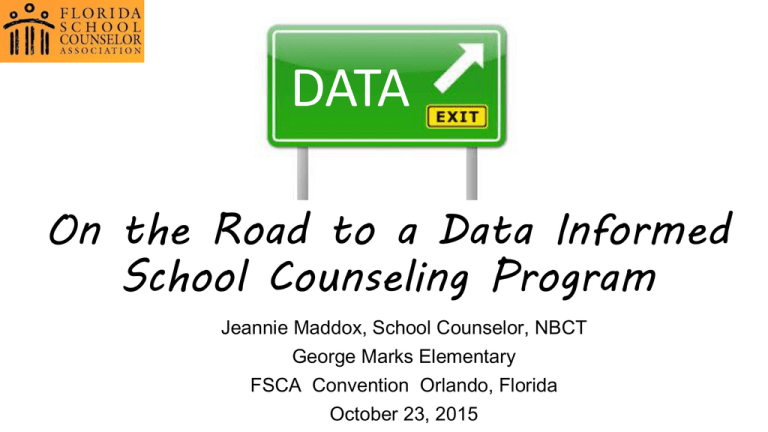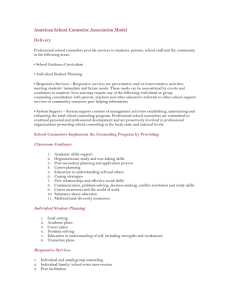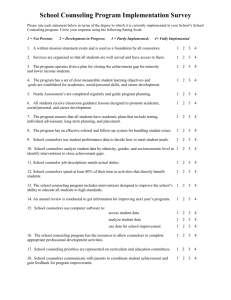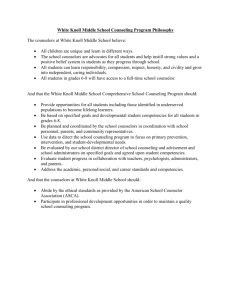A Data Driven School Counseling Program
advertisement

DATA On the Road to a Data Informed School Counseling Program Jeannie Maddox, School Counselor, NBCT George Marks Elementary FSCA Convention Orlando, Florida October 23, 2015 • Smart phone- text Jeanniemaddo018 to 37607 • Laptop or tablet pollev.com/jeanniemaddo018 The following live polls are brought to you by: PollEverywhere.com Your thoughts and questions about data… Overview • What is data informed school counseling? • Why is it important for School Counselors to use data? • Demystifying data! The 6 types • Accessing data • Using data to identify a goal • Writing an action and results plan Feelings about Data • On a smart phone? Text jeanniemaddo018 to 37607 to join • Wait to type “leave” until our last poll • On a laptop or tablet? Go to pollev.com/jeanniemaddo018 • Select the picture that best depicts how you feel about data Encouraging words for School Counselors Trish Hatch says at the end of her book, The Use of Data in School Counseling, “… I do know that some of the most amazing work school counselors will ever do, they will never be able to measure. I truly and deeply know that. Some of the “work” we do as school counselors is work we are called to do. I was called to be a school counselor. Some of my best days as a school counselor were truly the very worst days for others, and it was on those days, when I left my school, I knew, I truly knew that I was there for a reason. School counseling is a calling. It is my calling. It is my purpose on the planet.” What’s up with all this data talk? “School counselors traditionally have offered time-on-task data (Gysbers & Henderson, 2000) or a numerical summary of the different types of activities delivered as a means of assessing and evaluating the impact of a school counseling program. Merely presenting the numbers of students seen individually, in groups, or in classrooms is no longer enough.” “Legislators, school boards, administrators, and faculty concerned with accountability issues may not see the work of school counselors as being an effective utilization of financial resources to improve student achievement. Accountability offers the opportunity for school counselors to demonstrate how they can effectively identify and rectify issues that impede student achievement and provide suitable educational opportunities.” “Leaving No School Counselor Behind” Carol A. Dahir and Carolyn Stone “Accountability involves using data to improve comprehensive school counseling programs and student achievement outcomes, and in reporting information to stakeholders which subsequently increases school Counselor credibility.” Dr. Tyler Kimbal, The Development and Validation of the School Counseling Report Card – Student Version Data driven or data informed? Data driven: • Describes decisions made solely on the data • Just the cold, hard facts • Does not allow you to make decisions based on other sources or factors (outliers, med changes, program changes, new curriculum, etc.) Data informed: • • • • Use data “in context” to help your school excel Continuous improvement (reviewed regularly) Flexible, responsive, intelligent Measure, observe, improve, refine DATA “Data doesn’t drive anything— professional judgment does. The data just informs what is going on.” Dr. Jeffrey Wayman, 2012 How prepared are you? Looking at our data… • What does this data say about this sample of School Counselors practicing in Florida today? • What need would you identify for our group of School Counselors? • What it doesn’t say… Moving forward… • We have to go from knowing about data to knowing how to use data • Face our fears • Start small and build • Remember: it is a learning process “We must always remember that the goal is for us to learn from the data, not to be evaluated on the data.” ~Trish Hatch What is a data informed school Counseling program? “…the intentional use of the best available evidence in planning, implementing, and evaluating school counseling interventions and programs.” Evidence-Based School Counseling: Making a Difference with Data-Driven Practices, Dimmitt, Carey, and Hatch, 2007 • designed and delivered based on student data • standards based ie: ASCA Mindsets and Behaviors, other standards and initiatives at state and district levels • measures the results of our school counseling programs • promotes systemic change where necessary How does a data informed school counseling program benefit students? • Provides relevant and effective programs based on data • Provides lessons/information for ALL students (Tier 1) • Assists student in obtaining standard or competency based skills • Identifies specific needs (Tier 2) • Increases achievement data • Takes non-counseling jobs off the counselor’s plate • Gives students and Counselors more time together How does a data informed school counseling program benefit School Counselors? • Eliminates random acts of guidance • Counselors can use data to tell their story, create policy change • Advocate for practices that promote academic achievement and success for ALL –addresses discrepancies between behavior/academic data between students of different demographic groups (closing the gap plan) • Creates collaborative School Counselor calendar • Demonstrates the effectiveness of School Counselors • Builds a strong comprehensive program Shows how students are different because of what school counselors do. Two Prong approach to a Data Informed School Counseling Program Small number of students with special needs, not appropriate for intentional guidance plan; may need to refer out Intentional Guidance Some students need more ALL students need to know School wide goals, standards based curriculum Why is data important? “It is no longer enough for Professional School Counselors to answer the question, ‘What do school counselors do?’ Professional School Counselors must now respond to the question, “How are students different as a result of what we do?” ~ASCA National Model COLLECT DATA “Data” defined DATA School Generated Achievement Data Achievement Related Data Counselor Generated Pre/post tests Faculty/parent/ student surveys Achievement Data Often looked at as the measure of success in schools, used to compare one school to another, can close schools and reassign personnel. Measures a student’s academic progress. • EXAMPLES: Standardized test results (FCAT, FSA) Retention rate Pass rate for HS exit exam Algebra pass rate GPA SAT/ACT scores Changes in achievement levels (math/reading) Drop out rate Completion of college prep requirements College freshmen remediation rates Achievement-Related Data “elements impacting or correlating to student achievement.” Hatch, 2013 When students behave, attend school, do HW, enroll in rigorous courses they perform better. • EXAMPLES: Discipline referrals and suspension rates Attendance rates Course enrollment patterns Homework completion rates Report Card grades Parental involvement • This data is more easily available to SC • These activities more directly align to SC services Making Data Connections Competency Attainment Believe it is important to come to school Demonstrate Self-contol AchievementRelated Data Achievement Data Increase Attendance Increase Achievement (GPA) Reduced Discipline Referrals, Improved School climate Improved Achievement (Benchmarks) More TYPES of DATA Process Data • • • • • What you did for whom? Where did you spend your time? How many students did you impact? Are these services directly related to students? Can only a professional school counselor perform these functions? • • • • • EXAMPLES: time in responsive services, in classes, in small groups All 120 incoming 5th graders were seen individually for minute meetings in Sept. and Jan. All students in grades 6-7 (270) received 2 lessons on cyber safety Four counseling groups of 10th graders each with 6 students each met for 6 study skills sessions 30 hours this month spent in before/after school bus duty “What did you do for whom?” Recording Process Data Process Data Tools • https://sconlineprofessionalexchange.wikispaces.com/EZAnalyze FREE • https://www.google.com/forms/about/ FREE • https://www.notecounselorweb.com/ free for 30 day trial, then $49 yr • http://counselorapp.com/ $20 for 30 day trial, $120 yr Perception Data • • • • From documenting to demonstrating What do students think they know? (knowledge) What do they believe? (attitude) What can they do or demonstrate as a result of a lesson, activity, or intervention? (skills) • Measures competency achieved • A attitude 29% of students feel unsafe in the bathroom • S skills 95% of students can figure their GPA • K knowledge 91% of students can name 3 ways to handle a bully Perception Data Tools • Needs assessments • Pre/post tests • Survey/ratings scales Tools: • Clickers (personal response device) • Kahoot! • Plickers.com • PollEverywhere.com • Exit slips • Completion of an activity • Fist rating Outcome (results) Data • • • • • • Measures the impact of a lesson, activity, intervention The “so what” The proof behavior has changed Proof of SC program effectiveness Hard data that shows how students are different Compared to previous achievement related data • 60% of students with F’s brought their grade up to a C or better from Q1 to Q2 • 31% decrease in discipline referrals from Q1 to Q2 • 77% increase in daily attendance of targeted students for 2014-15 SY Outcome (results) Data Tools • Action plans • Results reports • School and Counselor generated data reports • What does the data tell you? • Was the program a success? • What worked, what didn’t, what needs to be changed? Data over time Data collected in 3 time frames • Immediate: pre/post test, surveys, needs assessments • Intermediate: end of a group or grading period • Long range: data impact from year to year • Example: behavior data • Immediate- pre test with students, survey Teachers/parents on student behavior • Intermediate- end of group post test • Long range: EOY behavior data Hatching Results Conceptual Diagram Process Data (Hatch 2005b) Perception Data Competency Attainment Data Results Data Achievement Related Data Guidance Lessons Group Counseling Individual Counseling Who? What? When ? Where? How long? School Counseling Curriculum Intentional Guidance (Intervention) Achievement Data Accessing Data Sources • Attendance • Discipline referrals • Report cards with D’s and F’s • Report Cards with 2’s and 3’s • Climate surveys • Student, parent, faculty needs assessments/surveys, pre/post tests School Data Base Assistant Principal, School Data Base Gradebook Contact, School Data Base School Psychologist Principal/SAC contact Generated/created by you Disaggregating data • Data refined into subgroups • Create School Data Profile • Gender, ethnicity, SES, ESE, ESOL, grade level, teacher, language, location, discipline offense • Compares data from different groups to better understand the implications and meaning of data • Where and how to intervene can occur at various levels, individual, class, group, school wide, home, community Interpreting Your Data • What pictures, patterns, or gaps does the data suggest? • What problems or needs surfaced? • What inequities exist? • Achievement gaps? • Opportunity gaps? • Are there systems changes that need to be made? • Which programs impact students? • Which programs meet the identified need? • Does the data implicates some programs? • Are there components/programs that to be re-evaluated, eliminated, or replaced? • How are students different because of what I’ve done? Counselors Using Data • Shelia is a middle school counselor in a low income, urban school that has a high number of detentions in the 8th grade. She decides to develop and implement a social skills training intervention consisting of both peer-to-peer conflict resolution training and student teacher communication skills training. Shelia develops the materials and trains personnel. The program is implemented in the advisory period. Her pre/post test evaluation indicates most students learned the targeted concepts and can describe instances in which they use the conflict resolution skills. • What do you think of Shelia’s action plan? Counselors doing data right! • Shelia does a quick analysis of the reasons for detention and finds that 70% of the students are sent to detention for chronically missing homework and 30% for inappropriate conduct. She recommends to her administration that detentions be for conduct problems only, and sets as her goal reducing the weekly referral rate by 50% by midyear. She organizes a school homework group and publicizes this group to both the general student population and specifically to students with chronic homework problems and to the parents of these students. She also establishes a conflict resolution group, recruiting as members students who were sent to detention for inappropriate conduct. Shelia tracks participation in both interventions and tracks the weekly detention rate. By midyear it has dropped 55%. • What do you think of Sheila’s action plan now? What is different? Setting Goals SMART • S specific • M measurable • A attainable • R results-oriented • T time-bound Gap/Problem/Issue impacting student success Based on existing data Challenging but achievable Collect/analyze process, perception, outcome data Timeline to accomplish goal, analyze/share data • See handout for SMART goal samples Setting SMART Goals The (who) will _______ (increasing/decreasing) the (identified need) for (identified group) by (%) in the 2014-25 school year to (%) in the 2015-2016 school year. • The School Counseling Department will assist with reducing the number of discipline referrals by students with 4 or more referrals by 15% by providing weekly small group counseling and check-in intervention. • During the 2015-2016 SY, the School Counseling Department will assist in decreasing the absences of 7th and 8th graders with 15 or more absences by 50%. Action and Results plans Action plan: specific plan for addressing data needs, who ,what, how, when, materials, procedures, permissions, create perception data collection instruments? Results plan: same plan as above plus data effectiveness- process, perception, outcome and implications (reflections) How do I begin to implement a data informed counseling program? Start small. Just choose one thing! • Data “scavenger hunt” (what is needed? ATT, grades, EWS, ODR) • Analyze your data • Look for trends/problems • Set SMART goal(s)* • Develop an action plan(s)* • Set a calendar • Prepare lessons(curriculum and materials) • Deliver lessons/group/intervention* • Evaluate (all data –immediate, intermediate, long range) • Advocate and Share • Repeat Ten Steps to being data informed! Summing it all up… • “The purpose of collecting data is to simply inform what you already do.” • DATA gives credibility to our profession, it demonstrates how School Counselors make a difference. • It demonstrates the value of School Counselors and how we impact the bottom line, student learning. • It gives administrators visuals and concise facts that demonstrate program effectiveness. • Administrators, legislators, and taxpayers must have knowledge and evidence of what we do to justify and advocate for our positions. Young and Kaffenberger, 2011 Resources • Evidenced-Based School Counseling Conference, Dr. Trish Hatch, Keynote Erlanger, Kentucky March 2015 • Evidenced-Based School Counseling Conference, Erlanger, Kentucky, March 2015 presenters from Lindemen Elementary School and Lewis and Clark College • The Use of Data in School Counseling, Dr. Trish Hatch, 2014, Corwin Press. • Evidenced Based School Counseling: Making a Difference with Data Driven Practices, Carey Dimmitt, John C. Carey, Trish Hatch, 2007, Corwin Press. • “The Beliefs and Practices of School Counselors Who Use Data to Implement Comprehensive School Counseling Programs,” Anita Young and Carol Kaffenberger, 2011. https://www.questia.com/library/journal/1G1276135160/the-beliefs-and-practices-of-school-counselors-who • ASCA website, www.schoolcounselor.org • The Development and Validation of the School Counseling Report Card – Student Version, Dr. Tyler Kimbal Resources • Andrew Chen andrewchen.co Data Informed v. Data Driven • Beth Kanter Why Data informed v. Data Driven, Feb.21, 2013, http://www.bethkanter.org/data-informed/ • American Counseling Association, Vistas Online, Article 18Leaving No School Counselor Behind, Carol A. Dahir and Carolyn Stone, http://www.counseling.org/Resources/Library/VISTAS/vistas04/18.pdf Data, Data, Data: Steps and Tools for Planning and Using your Data http://schoolcounseling.ncdpi.wikispaces.net/file/view/C.+Data+Literacy+ for+School+Counselors.pdf Thank you for joining me! For more information contact me at: jmaddox@volusia.k12.fl.us or jeanniemaddox87@gmail.com Follow my blog at http://exploringschoolcounseling.blogspot.com Facebook: Exploring School Counseling Twitter @ExploringSchC






